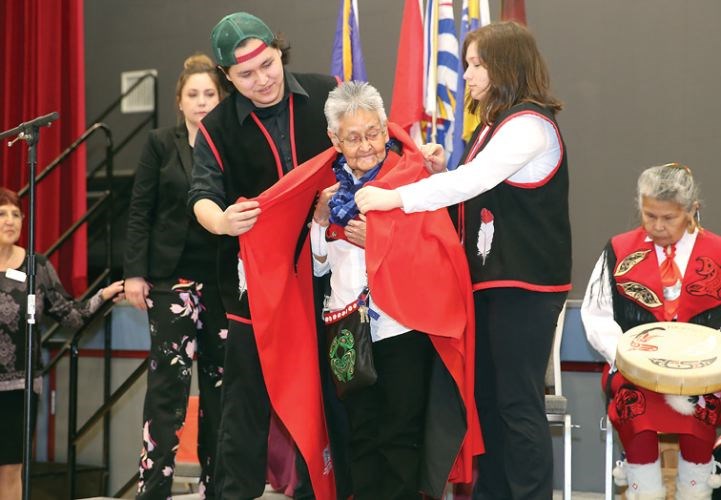Complete with traditional drumming and dancing and the bestowing of ceremonial blankets, a celebration was held Friday for the launch of a new kind of court in Prince George - one meant to end the revolving door for Indigenous people caught up in the criminal justice system.
Speaking to a packed room at the Civic Centre, B.C. Provincial Court chief judge Thomas Crabtree provided a primer on how it works.
"The Indigenous court is a process that treats people in a respectful way, focussing on those underlying causes of the behaviour and in doing so recognizes that the individual before the court is not a bad person but a person that has simply committed an inappropriate act," he said.
There are some ground rules. The offence committed must be minor and the offender must plead guilty. Beyond that, the process is open to anyone who self-identifies as Indigenous - a status card is not a prerequisite.
Hearings will still be held at the Prince George courthouse where a provincial court judge oversee what amounts to a restorative justice sentencing circle made up of the accused, the victim, elders and an array of people in support.
"Through a discussion, there is an attempt to understand what's driving this person to act in the way he or she did," Crabtree said. "The time is spent trying to address what supports can be put in place to assist that person and to aid in the road to recovery.
"Through those discussions, how that person can make amends to the victim that's been harmed or the community that has been harmed as a result of that person's actions. It is an attempt to build a reconciliation."
Through the "guidance assistance and the wisdom of the elders" a plan is put in place to put the offender on the right path and prevent a repeat of the trouble.
"The elders provide the cultural guidance, they provide guidance and support to the judge about the traditional ways and those are the ideas that the judge needs to keep in mind when the appropriate disposition is finally determined," Crabtree said.
Over the following months, there will remain opportunities to return to the court and retool the plan according to circumstances. If the offender simply refuses to live up to the the plan, "the elders can also provide a corrective measure...and as I've said, nobody can dish it out like an elder."
Most plans will take six months to a year to complete and ceremonies will be held upon their completion. The idea is for offenders to find better ways, not just for themselves but for their families and communities.
"It is with the assistance of the elders that I'm convinced that the First Nation's court, the community's court, will produce better outcomes," Crabtree said.
The persistence of Christina Draegen in getting the court established was repeatedly acknowledged. The lead on the group that worked for three years to bring the court to Prince George, she was variously described as a "force to be reckoned with" and someone whose "dedication and perseverance" has made the court possible.
Draegen pointed to some alarming statistics as a motivation. Three-quarters of the inmates at Prince George Regional Correctional Centre are Indigenous, and, despite making up just five per cent of the Canadian population, they make up 27 per cent of those in incarceration.
"It makes sense for us to consider an alternative approach to criminal justice," Draegen said.
The five elders upon which the court will centre are Violet Bozoki (Lheidli T'enneh), Ray Izony (Tsay Keh'nay), Lorretta Adams (Nisga'a), Tom Reece (Gitksan-Tsimshian) and Marcel Gagnon (Lheidli T'enneh).
Each was bestowed with a ceremonial blanket, as was Draegen.
It will be the sixth such court to be opened in B.C. The others are located in New Westminster, Duncan, Kamloops, North Vancouver and Merritt.
The court will convene on the first Tuesday of each month starting in April.



